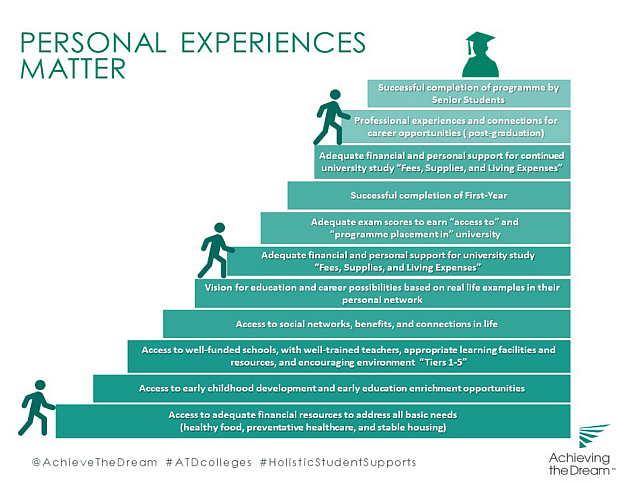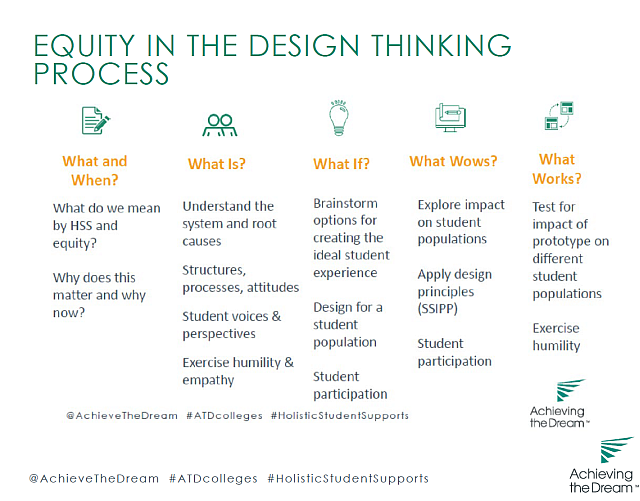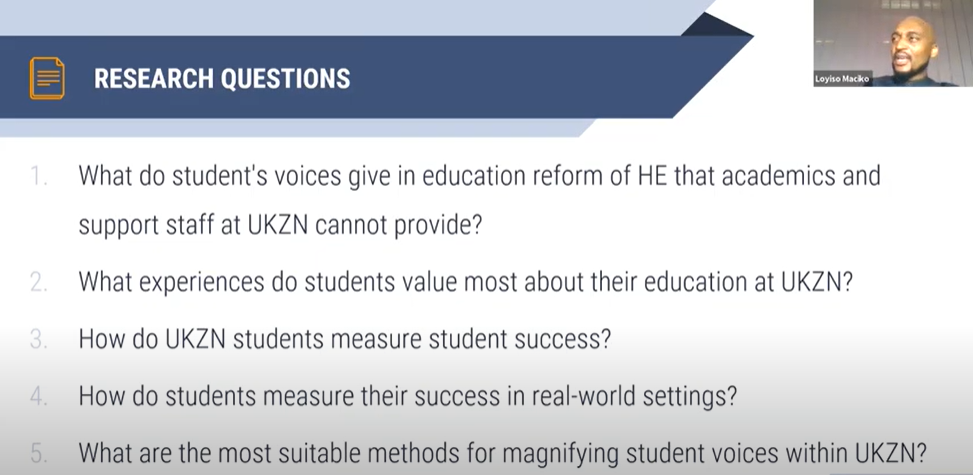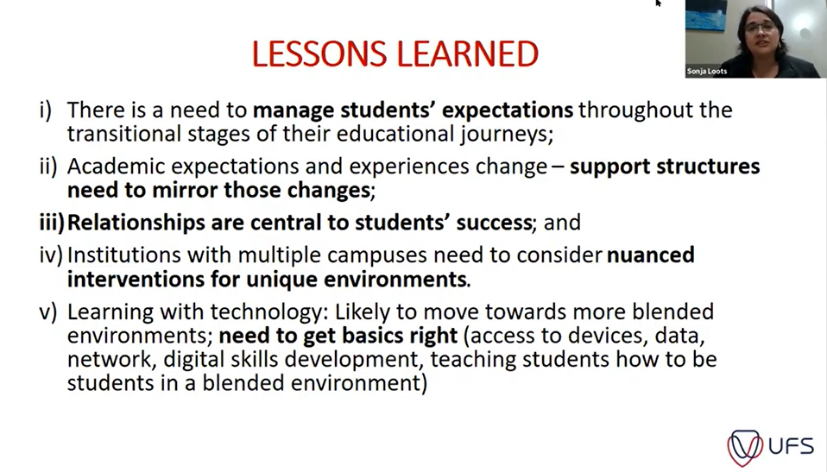

‘Not belonging’ - a lament echoed by many students worldwide, is often at the heart of academic challenges, and is one that the Siyaphumelela (We Succeed) initiative prioritises and has sought to address through amplifying the student voice in the higher education student success journey. Fatima Rahiman reflects on selected presentations made during the recent Siyaphumelela conference hosted by Saide.
Since its inception the Siyaphumelela initiative, has held annual conferences that provide a platform for the student voice through the dedicated student panel sessions. Over a few years, this voice has evolved significantly with students currently playing an active role in student success initiatives at their respective universities. With presentations from universities in both the United States and South Africa, this year’s conference showcased a number of different ways in which student’s active involvement influenced institutional support structures.
Dr Laurie Fadd, Director of Holistic Student Support at the Achieving the Dream (ATD) Network in the USA, led a panel presentation. The focus of this presentation was on the importance of knowing your students and on understanding the various personal circumstances that impact academic achievement in order to design successful support interventions. Figure 1, below exemplifies the types of personal experience that need to be taken into account when designing such interventions.

Figure 1: Personal Experiences Matter
Source: Fadd, L.,Presentation: Designing for Success by Incorporating Students’ Voices
This inclusive approach of involving students was echoed by the keynote speaker, Shaun Harper. He emphasised the importance of moving beyond viewing students merely as ‘data points’, cautioning that this would risk an incomplete understanding of the student context. An approach that included student insights and active involvement would make manifest the “explanatory undercurrents” for the quantitative data mined, thus enabling effective solutions.
Reiterating this inclusivity principle, Laurie Fladd from ATD introduced the Equity in the Design Thinking process, highlighting the participation of students at almost every level of the design process. Student contributions to the process included their bringing their experience, perspective, input and feedback –all necessary for designing successful interventions and solutions that serve students well. (ATD advocates a holistic approach which they refer to as Holistic Student Support (HSS)).

Figure 2: Equity in the Design Process
Source: Fladd, L., Designing for Success by Incorporating Students’ Voices
For more information about this process and how institutions can implement this design, download the Know your students guide
We need to challenge ourselves to see our students not only as learners, but also as individuals whose life contexts impact their academic journey (Achieving the Dream, 2021)
To illustrate the deployment of the design thinking approach, two case studies - from Northern Kentucky University in the United States and Durban University of Technology (DUT) in South Africa - were showcased as part of the ATD team’s presentation. Whilst each case study had unique, innovative and varied ways of involving students to address particular support initiatives, an interesting feature in both case studies was the use of informal communication mechanisms to include student voices.
The Northern Kentucky University shared some innovative approaches involving students such as their Whiteboard Wednesday programme. Every Wednesday a question regarding student concerns is posted on whiteboards with markers. These boards are placed across all the campuses, to solicit input from students passing by. Other formal ways of including students related to the leadership academies and committees.
DUT extensively used the network of communication platforms, ranging from the university’s Learning Management System (LMS) to social media platforms like WhatsApp, to keep students involved in their various student development support initiatives. Guided by the notion of ‘Nothing for us without us’ and in keeping with the objectives of their Envision 2030 institutional strategy, DUT involves students as key collaborators in making Envision 2030 a reality.
DUT’s Mzwandile Khumalo also emphasised the importance of guarding against a skewed deficit approach of viewing the student representative structures as antagonistic to the broader goal of the University. Rather, they recommended including students into various programmes as co-creators, citing the work of the VULA leadership academy as one such example where student-led initiatives for student-success were developed.
This student centric mind-set was echoed by Northern Kentucky University’s Bonita Brown who spoke about their university’s strategic planning framework called Success by Design which is singularly focused on student success. Commenting on this programme Brown said:
“We have to do what's best for the students even if it makes us a little uncomfortable so our design thinking, our success by design, has helped to shift our culture and how we think about our own work from day to day”
In both cases student voices have become a key strategic focus and have resulted in innovative ideas that have arisen from student input.
Mirroring the different personal learning experiences of students illustrated in Fladd’s keynote, a number of presentations by Partner Institutions in Siyaphumelela reflected a varied trajectory of institutional uptake of student voices in designing and implementing their strategic interventions.
In the presentation on Students Voice in shaping Teaching and Learning at UKZN - Is there value in listening? the University of KwaZulu Natal (UKZN) is currently conducting a number of focus group discussions, largely with student leadership groupings, to draw empirical evidence. The following research questions will be investigated:

Figure 3: Research questions
Source: Maciko, L. and Nguna, S., Students Voice in shaping Teaching and Learning at UKZN - Is there value in listening?
Next steps include, a thematic analysis of the responses which will then be considered before UKZN incorporates the input of student voices in the University’s project renewal process. The latter is an evaluative mechanism to see whether the university’s operations, curriculum, assessments, student support, and services are aligned with its vision and strategic priorities. This process is aimed at addressing the high student drop-out rate and thus seeks to consider the use of student voices to assist in the envisaged interventions.
In contrast, the University of Pretoria’s Finish Line is Yours (FLY@UP) programme, reflected a developmental journey of student success that began in 2009 with a focus on the First Year Experience and its attendant support ventures. In time, this programme diversified to include a range of student support ventures and eventually consolidated its approaches in 2020 with a focused intent on making student voices ‘audible’. The latter referred to engaging with students regarding their thoughts about their own success. Three strategies to amplify this voice and provide peer-encouragement were employed as follows; viz.
These strategies although aimed primarily at creating a sense of belonging for students also assisted in reducing the sense of isolation brought about by the Pandemic lockdown through extensive use of social media platforms. In addition, the use of a growth mind-set was employed to motivate students to succeed and complete their studies in minimum time with the support of mentorship by academic advisers.
Similarly, the University of Free State (UFS) also engaged with students about the factors they think are contributing to their success. A journey mapping methodology was used with 251 undergraduate students to ascertain this information. This study on How student voices are influencing institutional design highlighted seven stages of the student’s educational journey viz. the first-year experience, transitioning into senior years, experiences during senior years, and transitioning out of university. The study yielded several insights, including:

Figure 4: Lessons Learned
Source: Loots, S. Strydom, F. and Walters, S., How student voices are influencing institutional design
The most significant recommendation emanating from this engagement with students, was the need to establish a senior orientation programme – a hitherto overlooked aspect of student needs. This attested to the value of including student voices as a way of revealing a previously neglected area of student support.
This illuminating aspect of the inclusion of the student voice was further echoed in Nelson Mandela University’s presentation on the Advancing Quintile One to Three Student Support Interventions.
“I do not think that my background, computer illiteracy, cultural shock, language barrier, etc. caused my academic collapse in the first stream. What caused it, was the absence of concentrated guidance, personal support that is specific to my problems, understands my background, wells of knowledge and having experienced the same road I am travelling” (Hlumelo Sonjani, Siyaphumelela Conference 2021).
Here a personal reflection by a senior student provided an alternative perspective on the factors that may impede student success. In his presentation, Sojani contested the notion of compromised epistemic access hindering progress. Rather, he posited that it was the lack of peer guidance to access the available support, that may be the ultimate barrier to achieving success. The project, which is still in the planning stages, proposes having one-on-one Personal Mentors for first year students from quintile 1-3 socio-economic communities.
Not only limited to a clamour for guidance and support to new students, the student voice can also influence curriculum design as the Northwest University presentation, “Through the eyes of the student: Best practices in clinical facilitation”, concluded. Insights gleaned from 2nd, 3rd and 4th year nursing students showed how clinical facilitation can be improved. This study cast a critical lens on perceived best practices, exposing the discrepancies between what is taught and what is experienced, and how this may be optimised to ensure successful learning.
The 2021 Siyaphumelela Conference presentations highlighted rich examples of the evolution of student voices ranging from, feedback on their experiences to active participation in institutional interventions, with a marked recognition of students as vital stakeholders in planning processes. As part of their contractual obligations, Siyaphumelela Partner Institutions are required to demonstrate evidence of student voices on their project committees as well as student participation at Conferences. It is indeed exciting to note how Partner Institutions have responded to this requirement, embracing it as a significant aspect of their institutional strategic objectives.